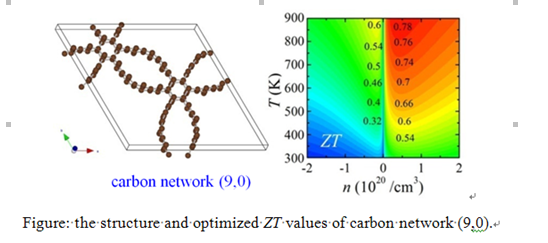Thermoelectric materials are being paid a lot of research attention in the past decades because of their direct conversion between heat and electricity. Due to the exhaustion of fossil fuels and the related environmental problems, it is urgently needed to develop eco-friendly thermoelectric devices with high performance.
Carbon materials such as carbon nanotubes and graphene don’t contain costly or toxic elements (Pb, Te, Bi, and Co) and are suitable for large-scaled fabrications. Recently, Jiang’s group at the Ningbo Institute of Materials Technology and Engineering, Chinese Academy of Sciences investigated the thermoelectric properties of three-dimensional covalently connected carbon networks (see following Figure)) by using first-principles calculation, Boltzmann transport theory, and nonequilibrium molecular dynamics simulations. It was found that the electronic transport of such networks exhibit “ballistic transport” behavior, similar to single carbon nanotubes. The thermoelectric performance of carbon materials with network structure is significantly improved while compared with those of one-dimensional carbon nanotubes, due to the high power factor and largely reduced thermal conductivity. The ZT value of carbon network (9,0) at intermediate temperature can be increased to 0.78 (see right-hand chart) by n-type doping with a carrier concentration of 3.9 × 1019 cm-3. Therefore carbon networks are expected to be potential candidates for eco-friendly thermoelectric materials. This work was published recently in RSC Adv., DOI: 10.1039/C4RA06149G.

Prof. Jun Jiang jjun@nimte.ac.cn
Research Group Url: http://manufacture.nimte.cas.cn/team/guangdian/about/
All Images by ![]()

